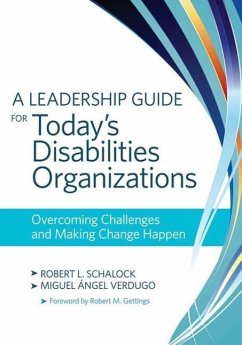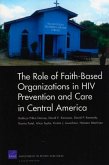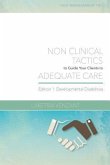Robert Schalock, Miguel Verdugo Alonso
A Leadership Guide for Today's Disabilities Organizations
Overcoming Challenges and Making Change Happen
Robert Schalock, Miguel Verdugo Alonso
A Leadership Guide for Today's Disabilities Organizations
Overcoming Challenges and Making Change Happen
- Broschiertes Buch
- Merkliste
- Auf die Merkliste
- Bewerten Bewerten
- Teilen
- Produkt teilen
- Produkterinnerung
- Produkterinnerung
Effective, efficient, and sustainable ID/DD organisations: are they possible in today's world of dwindling resources and mounting demands for more and better services? Yes—with the practical tools and strategies in this lifeline for ID/DD leaders. Developed by two of the most trusted authorities in the disability field, this innovative business leadership guide explains the nuts and bolts of successful change in clear and accessible terms, so any ID/DD organisation can adapt and thrive in a high-pressure landscape.
Andere Kunden interessierten sich auch für
![Leadership in Nonprofit Organizations Leadership in Nonprofit Organizations]() Leadership in Nonprofit Organizations538,99 €
Leadership in Nonprofit Organizations538,99 €![Making Self-Employment Work for People with Disabilities Making Self-Employment Work for People with Disabilities]() Cary GriffinMaking Self-Employment Work for People with Disabilities46,99 €
Cary GriffinMaking Self-Employment Work for People with Disabilities46,99 €![Planning and Support for People with Intellectual Disabilities Planning and Support for People with Intellectual Disabilities]() Planning and Support for People with Intellectual Disabilities60,99 €
Planning and Support for People with Intellectual Disabilities60,99 €![The Role of Faith-Based Organizations in HIV Prevention and Care in Central America The Role of Faith-Based Organizations in HIV Prevention and Care in Central America]() Kathryn Pitkin DeroseThe Role of Faith-Based Organizations in HIV Prevention and Care in Central America27,99 €
Kathryn Pitkin DeroseThe Role of Faith-Based Organizations in HIV Prevention and Care in Central America27,99 €![The Role of Faith-Based Organizations in HIV Prevention and Care in Central America (Spanish Translation) The Role of Faith-Based Organizations in HIV Prevention and Care in Central America (Spanish Translation)]() Kathryn Pitkin DeroseThe Role of Faith-Based Organizations in HIV Prevention and Care in Central America (Spanish Translation)23,99 €
Kathryn Pitkin DeroseThe Role of Faith-Based Organizations in HIV Prevention and Care in Central America (Spanish Translation)23,99 €![The Complete Directory for People with Disabilities The Complete Directory for People with Disabilities]() The Complete Directory for People with Disabilities224,99 €
The Complete Directory for People with Disabilities224,99 €![Case Management 101: Non-Clinical Tactics to Guide Your Client to Adequate Care: Developmental Disabilities Edition Case Management 101: Non-Clinical Tactics to Guide Your Client to Adequate Care: Developmental Disabilities Edition]() Laketria R. VenzantCase Management 101: Non-Clinical Tactics to Guide Your Client to Adequate Care: Developmental Disabilities Edition22,99 €
Laketria R. VenzantCase Management 101: Non-Clinical Tactics to Guide Your Client to Adequate Care: Developmental Disabilities Edition22,99 €-
-
-
Effective, efficient, and sustainable ID/DD organisations: are they possible in today's world of dwindling resources and mounting demands for more and better services? Yes—with the practical tools and strategies in this lifeline for ID/DD leaders. Developed by two of the most trusted authorities in the disability field, this innovative business leadership guide explains the nuts and bolts of successful change in clear and accessible terms, so any ID/DD organisation can adapt and thrive in a high-pressure landscape.
Hinweis: Dieser Artikel kann nur an eine deutsche Lieferadresse ausgeliefert werden.
Hinweis: Dieser Artikel kann nur an eine deutsche Lieferadresse ausgeliefert werden.
Produktdetails
- Produktdetails
- Verlag: Brookes Publishing Company
- Abilities. edition
- Seitenzahl: 232
- Erscheinungstermin: 8. Februar 2012
- Englisch
- Abmessung: 261mm x 182mm x 15mm
- Gewicht: 411g
- ISBN-13: 9781598571813
- ISBN-10: 1598571818
- Artikelnr.: 34774845
- Verlag: Brookes Publishing Company
- Abilities. edition
- Seitenzahl: 232
- Erscheinungstermin: 8. Februar 2012
- Englisch
- Abmessung: 261mm x 182mm x 15mm
- Gewicht: 411g
- ISBN-13: 9781598571813
- ISBN-10: 1598571818
- Artikelnr.: 34774845
Robert L. Schalock, PhD, is professor emeritus at Hastings College (Nebraska), where he chaired the Psychology Department and directed the Cognitive Behavior Lab from 1967 to 2000. Since 1972, his work has focused on the development and evaluation of community-based programs for people with disabilities and the key role that the concept of quality of life plays in the planning and delivering of individualized services and supports. Dr. Schalock has published widely in the areas of personal and program outcomes, the supports paradigm, adaptive behavior, clinical judgment, and quality of life. He is a past president (1997-1998) and fellow of the American Association on Intellectual and Developmental Disabilities (AAIDD) and chaired the AAIDD Terminology and Classification committee that issued its most recent manual on diagnosis, classification, and systems of supports. He is also coauthor of the AAIDD Supports Intensity Scale and the Diagnostic Adaptive Behavior Scale. Dr. Schalock is a frequent speaker at national and international conferences and has assisted a number of countries in their efforts to develop community-based programs for people with intellectual and closely related developmental disabilities within the context of the supports paradigm, the quality-of-life construct, and outcomes-based evaluation. Miguel Ángel Verdugo Alonso, Ph.D., is Professor of Psychology of Disability and Director of the Institute on Community Integration (INICO) at the University of Salamanca in Spain, and Director of the Information Service on Disability of the Ministry of Health, Social Services, and Equality in Spain. He has been Director of the Master's in Integration of People with Disabilities: Quality-of-Life program and Director of the Master's in Integration of People with Disabilities: LatinoAmerican program at the University of Salamanca since 1990. He is also editor of the journal Siglo Cero. Valerie J. Bradley, M.A., has been President of the Human Services Research Institute since its inception in 1976. She has a master's degree from the Eagleton Institute of Politics at Rutgers University. Ms. Bradley has directed numerous state and federal policy evaluations that have contributed to the expansion, enhancement, and responsiveness of services and supports for people with disabilities and their families. She helped to design skills standards for human services workers, conducted a study to translate the experience with decentralization in Scandinavia to an American context, is the project director of a national evaluation of self-determination, and co-directs a national project on performance measurement. She is the co-editor of Creating Individual Supports for People with Developmental Disabilities: A Mandate for Change at Many Levels (Paul H. Brookes Publishing Co., 1994). Ms. Bradley is the recent past chair of the President's Committee on Mental Retardation. From 1977 to 1986, Dr. Gardner served as Director of Community Programs and then as Vice President for Community Program Development at The Kennedy Institute at The Johns Hopkins University. Dr. Gardner received his doctoral degree in a dual program of American Studies and American Social History from Indiana University. He was awarded a Joseph P. Kennedy, Jr., Post-doctoral Fellowship in Medical Ethics at the Harvard Medical School. Dr. Gardner later completed the Masters in Administrative Sciences program at The Johns Hopkins University. Dr. Gardner holds faculty appointments at The Johns Hopkins University and the University of Maryland. He has written and edited numerous publications in the field of human services. Dr. Gardner is a nationally recognized leader in the application of quality improvement methods to the field of human services. Through presentations at national conferences, in his teaching and writing, and during organizational consultations, Dr. Gardner argues that the measurement of quality must move from compliance with organizational processes to facilitating person-centered outcomes for people. Ruth Luckasson, J.D., is Regent's Professor and Professor of Special Education and Coordinator of Mental Retardation and Severe Disabilities in the College of Education at the University of New Mexico in Albuquerque. Professor Luckasson is Vice President of the American Association on Mental Retardation (AAMR). She served on former President Clinton's Committee on Mental Retardation, serves on the Litigation and Human Rights Committee of The Arc of the United States, and is the chair of the American Association on Mental Retardation's Committee on Terminology and Classification. Professor Luckasson formerly served as Chair of the American Bar Association Commission on Mental and Physical Disability Law. She has published widely in the areas of legal rights of people with disabilities, people with mental retardation as defendants and victims in the criminal justice system, the definition of mental retardation, and children in special education. Martha E. Snell, Ph.D., Professor Emeritus, Special Education, Curry School of Education, University of Virginia, 405 Emmet Street, Charlottesville Virginia 22904 Dr. Martha Snell is a Professor Emeritus of Special Education at the Curry School of Education, University of Virginia where she directed the teacher preparation program in severe disabilities for 30 years. With others, she has authored a number of books on teaching methods and the definition of intellectual disability and has been an active member of TASH and the American Association for Individuals with Intellectual and Developmental Disabilities. She directed both federal and state grants directed toward the preparation of teachers and research with individuals having intellectual disability and autism and their teachers; more recently her research has concerned Head Start classrooms and young children at risk. Her research topics have encompassed the inclusion of students with disabilities in general education classrooms, effective teaching strategies, communication intervention, and positive behavior support for problem behavior.







